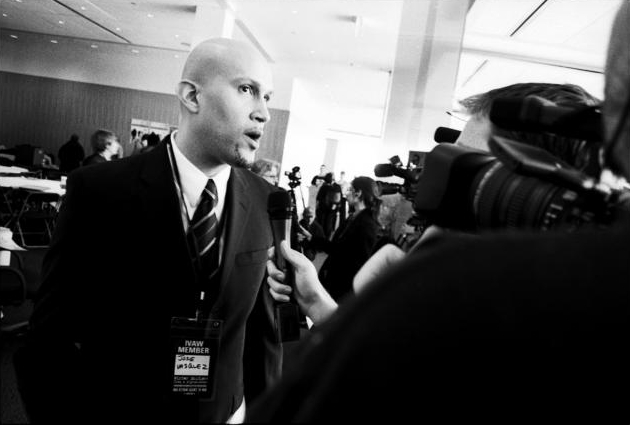Podcast: Play in new window | Download
WBAI Listeners Please Click Here For This Week’s Rundown
The United States and Yemen: Destroying Lives in the Name of National Security
We hear the voices of leading Yemeni activists and a Center For Constitutional Rights attorney speak on state violence, targeted killings, and human rights abuses enabled by the so-called “War on Terror” from the Brecht Forum event titled The United States and Yemen: Destroying Lives in the Name of National Security. The event was co-sponsored by the International Federation for Human Rights and the Brecht Forum. We hear first from Pardiss Kebriaei staff attorney at the Center for Constitutional Rights. Pardiss is working on a lawsuit to challenge a U.S. government kill-list and the targeting of a U.S. citizen now in Yemen and far from any armed conflict with the United States.
We hear from Tawakkol Karman chairwoman of the Yemeni non-government organization Women Journalists Without Chains, which campaigns for freedom of the press in Yemen and against human rights violations. She is a very prominent young activist, and Reporters Without Borders chose her in 2009 as one of the top seven women who have led change in the world. Karman is among the activists who in 2007 launched the “Phase of Protests and Sit-ins” in Yemen, holding regular sit-ins in the capital’s Freedom Square to demand democratic reforms and an end to human rights violations—including the harassment and imprisonment of journalists and dissidents, closure of critical newspapers, and censorship of news articles. A special thanks to Leili Kashani Education and Outreach Associate for the Guantánamo Global Justice Initiative at the Center for Constitutional Rights.
Also on the panel, to be heard soon, Ezz-Adeen Al-Asbahi, president of Human Rights Information & Training Center (HRITC), a non-governmental organization which seeks to enhance human rights in Yemen and the Arab World, focusing on the Gulf States in particular. HRITC has consultative status with the United Nations, offers training courses and forums on human rights, publishes a quarterly human rights magazine called Our Rights, and has published 30 books on law and human rights. Al-Asbahi is also the coordinator of a large regional network of human rights activists in the Gulf States and the Peninsula, and the president of a Yemeni network of human rights organizations which includes six Yemeni NGOs. A journalist and researcher, he has published eight books on literature and human rights. He is also the head of the civil society sector of the Supreme National Authority to Combat Corruption.
—-
Troops out of Iraq, Permanent Bases and Privatizing the Occupation.
While many reports claim most US troops are leaving Iraq, there will still be 50 thousand troops remaining, 4 thousand will be replaced by 7 thousand security contractors. These are armed private contractors, former military with specialized skills in weaponry, radar and explosives. They will have less accountability in war zones. Meanwhile, massive permanent US bases remain including the world’s largest US Embassy in Bagdhad, Iraq. As the occupation in Iraq is privatized, veterans return back to the US. We’re joined today by conscientious objecter and Executive Director of Iraq Veterans Against the War, Jose Vasquez. Jose joined IVAW in June 2005 and co-founded the NYC chapter serving as the president. He also served on the interim board of directors and was elected to the first official board in 2006. He helped organize numerous actions and events including the Veterans’ and Survivors’ March to New Orleans, Operation First Casualty in NYC, and Winter Soldier: Iraq and Afghanistan.
- IVAW is a membership based organization, we are all folks who’ve served since September 11th.
- We call for the immediate withdrawal of all occupying forces from Iraq. We also have the same resolution for Afghanistan. We also want reparations for the Iraqis and full benefits for returning service members.
- I signed up right out of high school, graduated in ’92. I went straight in to active duty, I served 4 years as a Calvary Scout. Got out went to school and the Army Reserves as a medic.
- I had been in the military for a while before September 11th. I had a pretty good understanding of what our relationship was to Iraq. It was confusing to me, I was facing deployment. I stumbled across Democracy Now and I just started listening to that show religiously.
- By 2004, I was so upset about the Iraq War, I didn’t care what happened, I was not going to this.
- I started researching conscientious objection, six months later I filed for CO status. It took 27 months to get an answer.
- The Obama Administration has a finger on the pulse in terms of marketing hope. What they’re skimming over is how contractors are on the ground (in Iraq)
- From the perspective of an Iraqi, Americans running around with guns has not diminished that much.
- I think we owe the people of Iraq a lot. This mostly has to do with the US positioning itself to access the resources that they have.
- Stop the deployment of PTSD troops
Guest – Jose Vasquez, Jose was born in Bronx, NY and grew up in Southern California from the age of nine. After graduating high school in 1992, he enlisted in the U.S. Army serving over four years of active duty as a cavalry scout assigned to the 2nd Battalion, 69th Armor Regiment, 24th Infantry Division at Fort Benning, GA, and the 3rd Squadron, 4th Cavalry Regiment, 25th Infantry Division at Schofield Barracks, HI. He was honorably discharged in December 1996 at the rank of specialist (E-4).


